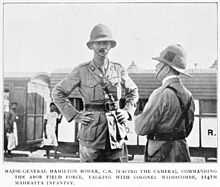Hamilton Bower

Major-General Sir Hamilton Bower KCB (1858–1940) was a British Indian Army officer who wrote about his travels through Chinese Turkestan and Tibet.
Early Military Career
Originally commissioned into the Duke of Edinburgh's Own Artillery Militia, he was appointed a Second Lieutenant in the Devonshire Regiment 23 October 1880.[1] He was appointed to the Indian Staff Corps 2 February 1884[2][3] and posted to the 17th Cavalry 15 September 1885.[4]
Sanskrit medical manuscript
In 1889-1890 Lieutenant Hamilton Bower travelled through Chinese Turkestan, where in the city of Kucha he purchased a Sanskrit-language manuscript written in the Brahmi alphabet.[5] The medical manuscript, which later became known as the Bower Manuscript, sent a shock-wave through the world of Indian scholarship, especially Indology, pointing to the existence of a forgotten Buddhist civilization in Chinese Turkestan.[6]
During his time in Turkestan, Bower, who was then a British intelligence officer on a Government mission, attempted to track down the killer of Andrew Dalgleish, a Scottish trader murdered on the road from Leh to Yarkand in 1888.[7]
In the 1890s Bower travelled to Tibet and wrote a memoir of his experiences entitled Diary of a Journey across Tibet. In 1894 he received the Royal Geographical Society's Gold Medal "for his remarkable journey across Tibet, from west to east".[8]
Later Military Career
Served as D.A.Q.M.G (Intelligence) 18 April 1893 to 4 May 1895.[4] Served in the Dongola Expedition 1896 as D.A.Q.M.G (Intelligence) and was rewarded with a Brevet of Major.[9]
Raised and commanded the 1st Chinese Regiment at Wei-hei-Wei in 1898.[4] Served in China during the campaign in 1900 and was present at the relief of Tientsin and the relief of Peking in command of the 1st Chinese Regiment and was rewarded with a mention in dispatches and the brevet of Lieut-Colonel.[4]
Commanded the Legation Guard, Peking, 1 December 1901 to 24 November 1906.[4] Appointed Brevet Colonel 10 February 1904. Appointed Squadron Commander, 17th Cavalry 15 October 1906,[9] promoted Lieutenant-Colonel 23 October 1906. In January 1908 he was the second in command of the 17th Cavalry.[9]
Promoted Colonel 1 December 1908 and temporary Brigadier-general commanding the Dehra Ismail Khan Brigade[4] and subsequently the Assam Brigade. Promoted Major-General 15 February 1909 and appointed a Companion of the Order of the Bath CB in October 1910.[10]
He was the General Officer Commanding for the Abor campaign 1911-12 and was rewarded with promotion to Knight Commander of the Order of the Bath KCB.[11]
He retired a Major General on 30 January 1914.
He was appointed temporary Lieutenant-Colonel and commandant of the Haddington Volunteer Regiment 1 September 1916.[12]
List of publications
- Some notes on Tibetan affairs. Calcutta : Office of the Superintendent of Government Printing, India, 1893.
- Diary of a journey across Tibet. London: Rivington, Percival and Co., 1894.
- The Bower Manuscript : facsimile leaves, Nagari transcript, romanised transliteration and English trans. with notes. Calcutta : Off. of the Superintendent of Govt. Printing, 1894. co-authored with A. F. Rudolf Hoernle
- "A trip to Turkistan". Geographical Journal. 1895. 241-257
- "The Abor Expedition: Geographical Results: Discussion". Geographical Journal, Feb., 1913, vol. 41, no. 2, p. 109-114. co-authored with L A Bethell and Thomas Holdich
References
- ↑ London Gazette 22 October 1880
- ↑ London Gazette 3 June 1884
- ↑ London Gazette 3 November 1885
- ↑ 4.0 4.1 4.2 4.3 4.4 4.5 The Star and Crescent. Being the story of the 17th Cavalry from 1858 to 1922. page 287
- ↑ Ray H. Greenblatt. The Vanishing Trove: Reviled Heroes; Revered Thieves. The Chicago Literary Club. October 2, 2000
- ↑ Peter Hopkirk, Foreign Devils on the Silk Road: The Search for the Lost Cities and Treasures of Chinese Central Asia, 1980, p.44-45
- ↑ Hamilton Bower. "A trip to Turkistan". Geographical Journal. 1895. p.241-257
- ↑ Nature, Volume 49 (1894)
- ↑ 9.0 9.1 9.2 January 1908 Indian Army List
- ↑ London Gazette 24 October 1910
- ↑ London Gazette 23 August 1912
- ↑ London Gazette 1 September 1916
|